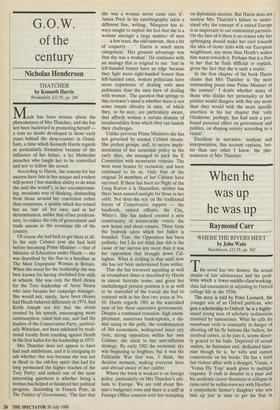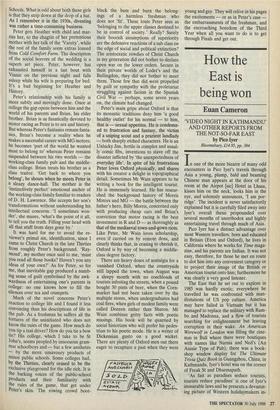When he was up he was up
Raymond Carr
WHERE THE RIVERS MEET by John Wain
Hutchinson, £12.95, pp. 563
This novel has two themes: the sexual strains of late adolescence and the prob- lems which a lower-middle-class/working- class lad encounters in adjusting to Oxford college life in the 1930s.
The story is told by Peter Leonard, the younger son of an Oxford publican, who gets a scholarship to Oxford: he is a highly- sexed young man of scholarly inclinations troubled by tumescence. What he calls his membrum virile is constantly in danger of shooting off his fly buttons like bullets; his cerebral cortex, as he puts it, seems direct- ly geared to his balls. Deprived of sexual outlets, he fantasises and, dedicated histo- rian though he is, he wilts and cannot concentrate on his books. He has a brief but violent affair with a shopgirl, Vinnie, a `Venus Fly Trap' much given to multiple orgasms. It ends in disaster in a punt and his academic career threatens to collapse in ruins until he rediscovers sex with Heather, a sympathetic farmer's daughter who sets him up just in time to get his first in Schools. What is odd about both these girls is that they strip down at the drop of a hat. As I remember it in the 1930s, divesting was rather a time-consuming business.
Peter gets Heather with child and mar- ries her, to the chagrin of her pretentious mother with her talk of the 'Varsity', while the rest of the family seem extras loaned from Cold Comfort Farm. The description of the social horrors of the wedding is a superb set piece. Peter, however, has exhausted himself in a last bout with Vinnie on the previous night and falls asleep while his wife is preparing for bed. It's a bad beginning for Heather and History.
Peter's relationship with his family is more subtly and movingly done. Once at college the gap opens between him and the world of his parents and Brian, his elder brother. Brian is as fanatically devoted to motor racing as Peter is to sex and history.
But whereas Peter's fantasies remain fanta- sies, Brian's become a reality when he makes a successful career with MG motors; he becomes 'part of the world he wanted most to belong to' whereas Peter remains suspended between his two worlds — the working-class family pub and the middle- class college. Brian treats his brother as a class traitor. 'Get back to where you belong', he shouts when he meets Peter in a sleazy dance-hall. The mother is the `instinctively perfect' emotional anchor of the working-class family familiar to readers of D. H. Lawrence. She accepts her son's transformations without understanding his intellectual concerns. `I sometimes won- der', she muses, 'what's the point of it all, to tell you the truth. Filling your head with all that stuff from days gone by.'
It was hard for me to avoid the re- viewer's primal sin, identification, since I came to Christ Church in the late Thirties from roughly Peter's background. 'Ray- mond', my mother once said to me, 'must You read all those books? Haven't you any ideas of your own?' As for Peter, so for me, that inevitable gap produced a numb- ing sense of guilt symbolised by the awk- wardness of entertaining one's parents in college: no one knows how to fill the silences over tea and crumpets.
Much of the novel concerns Peter's reaction to college life and I found it less convincing than his descriptions of life in the pub. As a freshman he suffers all the tortures of the uninitiated who does not know the rules of the game. How much do you tip a taxi driver? How do you tie a bow tie? His college, which I take to be St John's, seems peopled by innocuous gram- mar schoolboys and — bar a few aesthetes — by the more unsavoury products of minor public schools. Some colleges had, by the Thirties, clearly ceased to be the exclusive playground for the idle rich. It is the barking voices of the public-school products and their familiarity with the rules of the game, that get under Peter's skin. The rowing crowd boot- black the bum and burn the belong- ings of a harmless freshman who does not 'fit'. These louts Peter sees as `belonging to the upper classes destined to be in control of society.' Really? Surely their boorish assumptions of superiority are the defensive reactions of a sub class on the edge of social and political extinction? The aristocratic rowdies of Christ Church in my generation did not bother to declare open war on the lower orders. Secure in their private worlds of Loder's and the Bullingdon, they did not bother to meet them. Those few that did were propelled by guilt or sympathy with the proletariat struggling against facism in the Spanish Civil War — perhaps, some seven years on, the climate had changed.
Peter's main gripe about Oxford is that its monastic traditions deny him 'a good healthy outlet' for his normal — to him, that is — sexual appetites. He is condemn- ed to frustration and fantasy, the victim of a sniping scout and a prurient landlady — both sharply etched characters. He is an Unlucky Jim, fertile in complex and usual- ly comic fibs, inventions to stave off the disaster inflicted by 'the unexpectedness of everyday life'. In spite of his frustrations Peter loves Oxford physically, and shares with his creator a delight in topographical detail. Sometimes Mr Wain appears to be writing a book for the intelligent tourist. He is immensely learned. He has resear- ched the background history of Morris Motors and MG — the battle between the father's hero, Billy Morris, concerned only with producing cheap cars and Brian's conviction that motor racing is the best investment in R and D — as thoroughly as that of the mediaeval town-and-gown riots. Like Peter, Mr Wain loves scholarship, even if carried on by remote dons, and clearly thinks that, in ceasing to cherish it, Oxford is by way of becoming a middle- class degree factory.
There are heavy doses of nostalgia for a vanished Oxford, when the countryside still lapped the town, when August was a sleepy month with no coachloads of tourists infesting the streets, when a pound bought 30 pints of beer, when the Corn- market had not been taken over by the multiple stores, when undergraduates had coal fires, when girls of modest family were called Doreen rather than Sharon. Mr Wain combines gritty facts with poetic musings. His book will be quarried by social historians who will prefer his pedes- trian to his poetic mode. He is a writer of Dickensian gusto on a good wicket.
There are plenty of Oxford men out there eager to recapture a past when they were young and gay. They will relive in his pages the excitements — or as in Peter's case the embarrassments of the freshman, and the encroaching boredom of the Third Year when all you want to do is to get through Finals and get out.















































 Previous page
Previous page